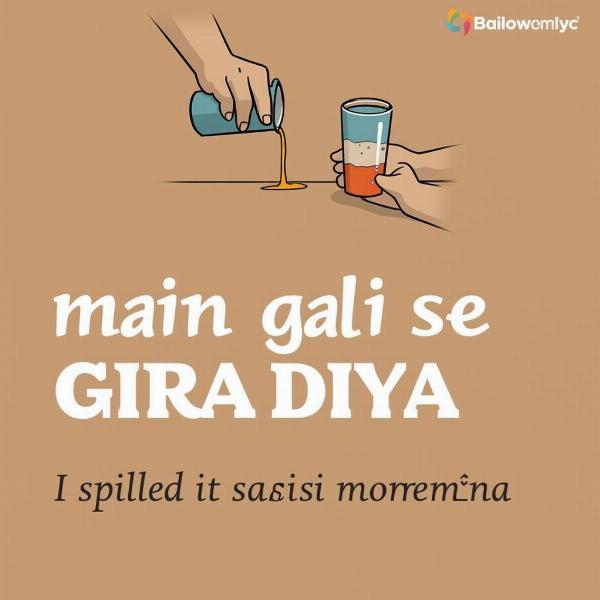Understanding how to express unintentional actions is crucial for effective communication. “It was by mistake meaning in Hindi” is a common search query, reflecting the need for clarity when explaining accidental occurrences. This article delves into various ways to convey this concept in Hindi, offering practical examples and insights into the nuances of the language. We’ll explore common phrases, cultural contexts, and provide you with the tools to confidently express yourself in various situations.
Expressing Unintentional Actions in Hindi
Several Hindi phrases effectively convey the meaning of “it was by mistake.” Choosing the right phrase depends on the context and the level of formality required. Here are some common options:
- गलती से (galti se): This is the most direct translation and means “by mistake.” It’s widely understood and suitable for most situations. For example, ” मैंने गलती से तुम्हारा फोन उठा लिया (maine galti se tumhara phone utha liya)” translates to “I picked up your phone by mistake.”
- अनजाने में (anjaane mein): This translates to “unintentionally” or “unknowingly.” It emphasizes the lack of awareness behind the action. Example: ” मैंने अनजाने में उसे चोट पहुँचाई (maine anjaane mein use chot pahunchaayi)” – “I hurt him unintentionally.”
- भूल से (bhul se): This means “by oversight” or “forgetfully.” It’s often used for less serious mistakes. Example: “मैं भूल से दरवाजा खुला छोड़ गया (main bhul se darwaza khula chhod gaya)” – “I left the door open by mistake.”
- कदाचित् (kadaachit): This is a more formal and less common word, meaning “perhaps” or “perchance,” implying an unintentional action. It is often used in written Hindi or formal speech.
 Example of "Galti Se" usage
Example of "Galti Se" usage
Cultural Context and Nuances
In Indian culture, admitting mistakes is often seen as a sign of humility and responsibility. Therefore, using phrases like “galti se” or “anjaane mein” can help diffuse potentially tense situations and demonstrate your good intentions. Understanding these cultural nuances is vital for effective communication.
Common Scenarios and Examples
Let’s explore how these phrases can be used in everyday conversations:
- Apologizing: ” माफ़ कीजिए, मैंने गलती से आपका पैर छू लिया (maaf kijiye, maine galti se aapka pair chhu liya)” – “Excuse me, I touched your foot by mistake.” (Touching someone’s feet is a sign of respect in Indian culture, but doing so accidentally can be awkward. This apology acknowledges the unintentional nature of the action.)
- Explaining a mishap: ” मैंने अनजाने में तुम्हारा सामान तोड़ दिया (maine anjaane mein tumhara saman tod diya)” – “I broke your thing unintentionally.”
- Clarifying an action: ” मैंने भूल से गलत बटन दबा दिया (maine bhul se galat button daba diya)” – “I pressed the wrong button by mistake.”
Did you mean…? Handling Misunderstandings
Sometimes, “it was by mistake” is used to clarify a misunderstanding. Hindi offers several ways to express this:
- मेरा मतलब यह नहीं था (mera matlab yeh nahin tha): “I didn’t mean that.” This is a common and versatile phrase.
- गलतफहमी हो गई (galatfehmi ho gayi): “There has been a misunderstanding.” This is useful for clarifying misinterpretations.
It Was by Mistake: Beyond Simple Errors
The concept of “it was by mistake” extends beyond simple errors. It can also relate to accidental discoveries or unintended consequences. For instance, “ मैंने गलती से एक नया रास्ता खोज लिया (maine galti se ek naya raasta khoj liya)” – “I discovered a new route by mistake.”
Conclusion: Mastering “It Was By Mistake” in Hindi
Understanding how to express unintentional actions is crucial for navigating everyday conversations and avoiding misunderstandings. By mastering these various phrases and considering the cultural context, you can communicate effectively and build stronger relationships. Remember to choose the phrase that best suits the situation, and don’t hesitate to apologize when necessary. This will help you communicate with sensitivity and respect. “It was by mistake meaning in Hindi” now holds a clearer, more nuanced meaning for you.
FAQ:
- What is the most common way to say “it was by mistake” in Hindi? Galti se is the most common and versatile phrase.
- Is there a formal way to say “it was by mistake”? Kadaachit is a more formal option.
- How do I apologize for a mistake in Hindi? Combine a phrase like “galti se” with “maaf kijiye” (excuse me).
- What if I unintentionally offended someone? Use “anjaane mein” to emphasize your lack of intent.
- How do I clarify a misunderstanding in Hindi? Use phrases like “mera matlab yeh nahin tha” or “galatfehmi ho gayi.”
Meaning-Hindi.in is your trusted partner for professional Hindi translation services. We specialize in various translation fields, including business and commercial documents, legal and certified translations, technical manuals, website localization, educational and academic materials, and urgent translations. Need accurate and culturally sensitive Hindi translations? Contact us today at [email protected] or call us at +91 11-4502-7584. Meaning-Hindi.in is committed to delivering high-quality translations that bridge language barriers and foster effective communication.